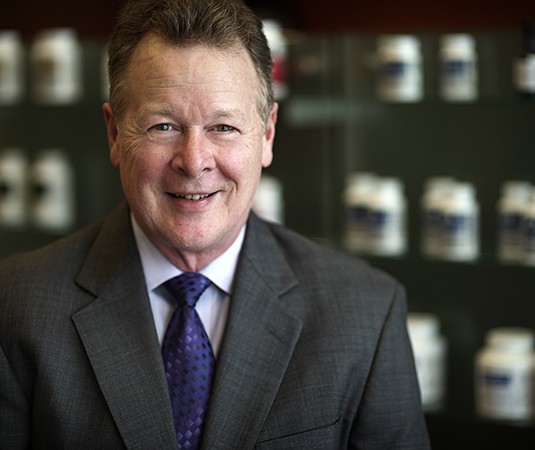by Jim Paoletti, BS Pharmacy, FAARM, FIACP
Providing good nutritional advice and nutritional supplements is an essential part of a comprehensive plan for generating long-term health in your patients, especially since numerous health conditions can stem from nutritional deficiencies. As a practitioner, you can choose to provide for nutritional needs within your practice by having a staff member who’s been trained in nutrition and has a good knowledge of the supplements available. It’s important to remember that time must be allotted for selling the supplements in the office, maintaining inventory/sales records and following up to ensure patient’s compliance. Additionally, as the practitioner, you should always have a solid knowledge of the supplements being sold.
There are a number of different avenues available to learn what is needed for supplying nutritional supplements. Many nutritional companies provide educational seminars, comprehensive literature and representatives as great sources of information. There are also programs available from at least three different organizations for learning functional medicine.
Instead of spending time and resources on educating your staff, you may choose to partner with a nutritionist or compounding pharmacist to provide your patients with nutritional counseling and supplements. There are a good number of compounding pharmacists that have undertaken nutritional training, and carry a reputable line of high quality supplements.
Categories of Natural Supplements
Natural supplements come in four categories. The highest is pharmaceutical grade, followed by medical grade, cosmetic grade and agricultural grade. Sometimes the terms “feed grade” and “human grade” are applied to natural supplement ingredients, but there is no strict legal definition of these terms. The FDA requires all raw ingredients and finished products that are intended to be consumed by humans be safe to eat, produced under sanitary conditions, and be truthfully labeled.
Quality of Natural Supplements
The quality of the supplements suggested for your patients is of utmost importance. There are a lot of nutritional supplements on the market that, in my opinion, are not worth the money. The government recently tested over 500 OTC supplements pulled from the shelves of stores like Walgreens, CVS, General Nutrition Center, and Target and found that over 85% were sub-potent and over 80% did not have all the ingredients in them that were listed on the label.
Supplements, vitamins and herbal products are not rigorously regulated like the pharmaceutical world and are seldom properly regulated by the FDA, as seen in the poor quality of the recent sampling of OTC supplements. The FDA leaves the responsibility to the manufacturer to make sure that the supplement they sell is safe before it is marketed. The FDA does not test supplements before they are sold. Failure of proper regulation and enforcement of the guidelines for human consumption has resulted in varying degrees of purity and quality in OTC products. Pharmaceutical grade supplements adhere to stricter guidelines and procedures when producing a formula for consumer use. Nutritional companies that supply pharmaceutical grade products will sample and test to ensure that the formulation protocols result in a high quality product. Pharmaceutical grade supplements are also sold through licensed health professionals.
The United States Pharmacopeia (USP) is responsibile for regulating medical-grade vitamins and supplements. Quality control always starts with the raw materials. The USP investigate the quality of processing and manufacturing, and ensure that the raw materials used are of the highest quality. Medical-grade supplements can only be sold through selected pharmacies and physicians, and the quality of these products is guaranteed. Medical grade supplements must contain 99% of the claimed ingredients.
Recommendations
My suggestion is to always recommend pharmaceutical or medical grade supplements to ensure your patients receive the highest quality ingredients. Most health professionals who are knowledgable in nutritional supplements, only sell products that have a certification from the United States Pharmacopeia (USP) or the National Science Foundation (NSF) NFA. Both of these non-profit governing bodies screen to make sure that vitamins and supplements are pure and of high quality.
Probably the toughest part of recommending nutritional supplements is deciding which are best for your patient’s unique needs, as well as their financial situation and their willingness to take what is recommended. I read once that a person will only take an average of 5.6 pills daily.
Over the coming months I plan to share with you my thoughts on the top nutritional needs for most patients, and recommendations for specific types of health concerns. For now, let me state that what I like every one of my patients to supplement are a daily MVM, Omega 3s, Vitamin D, magnesium, a probiotic and a good antioxidant combination product.
Jim Paoletti, BS Pharmacy, FAARFM, FIACP, is a Clinical Consultant with over 30 years of experience creating and using bio-identical hormone therapies in both retail pharmacy and clinical practice.
Jim is a Diplomat in Functional Medicine in addition to being a former faculty member for the Fellowship of Functional Medicine. Jim is also author of the book “A Practitioner’s Guide to Physiologic Bioidentical Hormone Balance.”
At Power2Practice, he applies his wealth of knowledge and experience by hosting live webinars and creating useful content, such as blogs, podcasts and clinical support tools.


